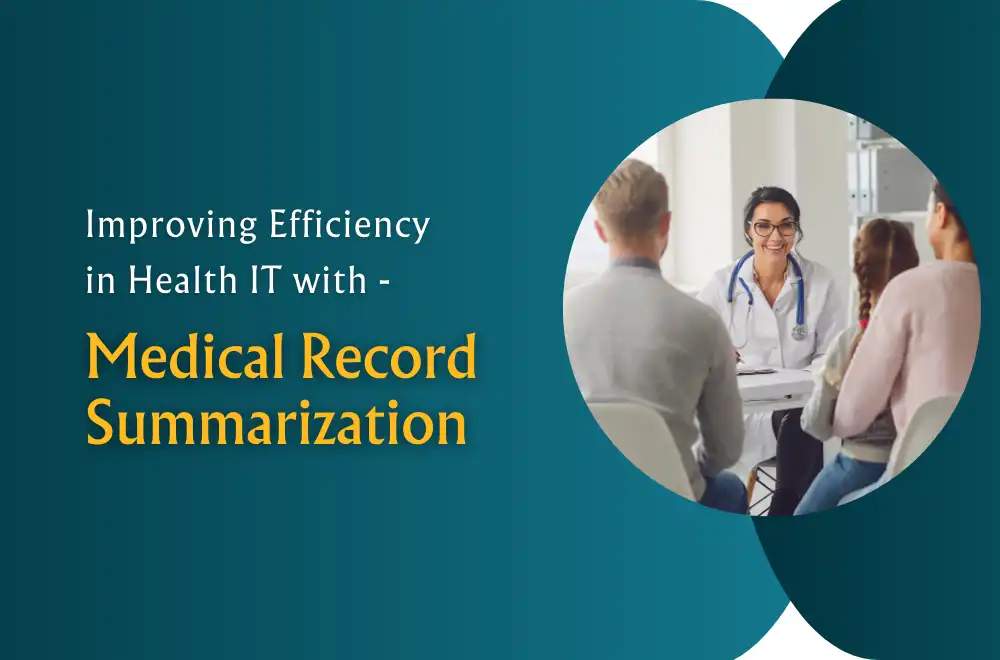In today's digital era, the healthcare industry is undergoing a transformation, with technology playing a crucial role in improving patient care, enhancing efficiency, and reducing costs. One significant advancement in this domain is the emergence of medical record summarization services. These innovative solutions have the potential to revolutionize the way patient information is processed, shared, and utilized. In this article, we will explore how medical record summarization services work, the benefits they offer, the challenges in implementing them, and what the future holds for this promising technology.
How Are Records Summarized?
Medical record summarization is the process of extracting relevant information from a patient's electronic health records (EHRs) and presenting it in a concise and easily understandable format. This summary consists of key medical information, such as diagnoses, treatment plans, medication history, allergies, and other critical data. It aims to provide healthcare professionals with a quick overview of a patient's medical history, enabling them to make informed decisions swiftly.
To carry out this task, medical record summarization services utilize advanced natural language processing (NLP) algorithms and machine learning techniques. These algorithms analyze the unstructured text within the patient's EHRs, identifying and extracting relevant information based on predefined criteria. Additionally, they can create a chronological narrative of the patient's medical history, called a medical records chronology, which further enhances the ease of understanding and accessibility of the information.
Benefits of Medical Record Summarization
-
Improved Efficiency and Time Savings
One of the primary benefits of medical record summarization is the significant time savings it offers to healthcare professionals. Instead of manually reviewing lengthy patient records, doctors and nurses can quickly access a summarized version of the most relevant information. This allows them to make accurate and timely diagnoses, develop appropriate treatment plans, and respond effectively to emergencies, ultimately improving patient outcomes.
-
Enhanced Patient Safety
Medical record summarization also plays a crucial role in enhancing patient safety. By providing a concise and easy-to-read summary of a patient's medical history, healthcare providers can quickly identify any potential drug interactions, allergies, or past adverse reactions. This information enables them to make safer decisions when prescribing medications or conducting medical procedures, reducing the risk of medical errors and improving patient safety.
-
Cost Savings and Revenue Generation
The impact of medical records summarization on healthcare costs and efficiency cannot be overlooked. By streamlining the process of reviewing patient records, healthcare organizations can achieve significant cost savings. The time saved by medical professionals can be allocated to other important tasks, resulting in increased productivity and potentially higher revenue generation.
-
Facilitates Research and Analytics
The availability of structured and summarized medical records can also greatly facilitate medical research and analytics. Researchers can easily access and analyze de-identified patient data, allowing them to identify patterns, trends, and insights that can lead to advancements in treatment protocols, disease management, and healthcare delivery.
Challenges in Implementing Medical Record Summarization
While medical record summarization holds immense potential, its implementation does come with its fair share of challenges. Here are a few key obstacles that need to be addressed:
-
Standardization and Interoperability
One of the challenges is ensuring standardization and interoperability across various EHR systems. Different healthcare institutions may use different coding systems, terminology, and data structures. Achieving compatibility between these systems is necessary for accurate and comprehensive medical record summarization.
-
Privacy and Security Concerns
Medical record summarization involves the extraction and processing of sensitive patient information, making privacy and security paramount. Health IT professionals must implement robust security measures to protect patient data and ensure compliance with privacy regulations, such as the Health Insurance Portability and Accountability Act (HIPAA).
-
Accuracy and Reliability
The accuracy and reliability of medical record summarization algorithms are crucial for their successful implementation. These algorithms need to be continuously trained and updated to keep up with changing medical terminology, guidelines, and research. Regular quality assurance processes should also be in place to verify the accuracy of the generated summaries.
Future of Medical Record Summarization
Looking ahead, the future of medical record summarization appears promising. As artificial intelligence (AI) and machine learning technologies continue to evolve, we can expect even more sophisticated algorithms that can process and summarize medical records with greater accuracy and speed.
Furthermore, advancements in interoperability standards and data exchange protocols will enable seamless sharing of summarized patient information between healthcare providers, leading to improved care coordination and patient outcomes.
The integration of medical record summarization services with other health IT systems, such as electronic prescribing and decision support tools, holds the potential for further optimization of healthcare delivery. These integrations can enhance clinical decision-making, automate administrative processes, and support evidence-based medicine.
Conclusion
As times change, more and more companies are investing in medical record summarization services. With the increasing need for summarization and other digitization of medical records, the world comes closer to bringing health IT closer to reality.

